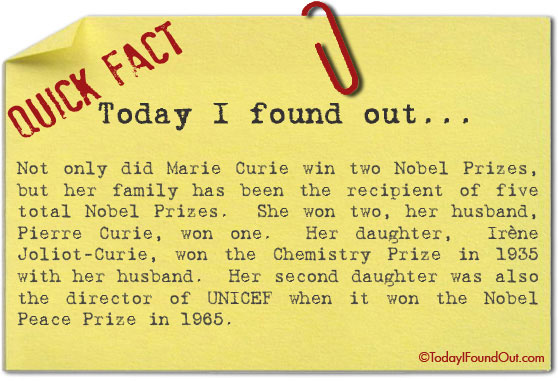Marie Curie’s Immediate Family Won a Total of Five Nobel Prizes
##EMBED##
Not only did Marie Curie win two Nobel Prizes, but her family has been the recipient of five total Nobel Prizes. She won two, her husband, Pierre Curie, won one. Her daughter, Irène Joliot-Curie, won the Chemistry Prize in 1935 with her husband. Her second daughter was also the director of UNICEF when it won the Nobel Peace Prize in 1965.
| Share the Knowledge! |
|






WRONG
Marie Curie shared her first Nobel with Pierre Curie.
Marie then won an individual Nobel.
Irene Shared her Nobel with her husband.
Eve’s husband then received a Nobel Peace Prize on behalf of UNICEF.
So in all, the Curie family shared 4 Nobel prizes between 5 people.
You are absolutely right. 4 Nobel
Prizes in all for the curie family. I fact the 1 st Nobel prize received by the Curie family in 1903 for physics was shared with Henri Bacquerel who received 1/2 of the prize money and the other half was shared between Pierre and Marie Curie.
The fifth prize was awarded to an organisation, UNICEF, and to an individual.
I don’t think it matters if someone “shared” the Nobel Prize. They are still considered a Nobel Laureate.
The Nobel Prize for the Transistor was shared between 3 people (Shockley, Bratton, and Bardeen). All 3 are considered Nobel Laureates.
i think Curie family recipient of 4 nobel prizes. one physics (1903), one chemistry ( m. curie alone) , irene and federic j. curie ( again chemistry ) and last one , peace as a member ! of UNICEF (1965).
The Curie family has four Nobel Prizes mainly Physics and One Peace. The Fischer family line which has three in Chemistry and One in Physiology and Medicine is tied. In some ways they are kind of tied but here are some things to think about. The Curie family is closer related. But some factors in deciding a Nobel Prize decision is obviously an equation on (1) What led to the discovery, the discovery itself, (2) Uses of the discovery, (3) Future uses of the discovery (Not necessarily in that order). I honestly believe in females in sciences that different perspectives are valuable sometimes but what should be openly discussed and is controversial that how processes and discoveries by males are usually what led to females discoveries also the future uses are usually discovered by males too and result in male labor, also males are so willing to do anything for females like give genetic information, information, ideas, gifts, and do anything for females. Then also consider is that Alfred Nobel invented dynamite without killing himself and he believed more in sciences, he was actually talked into adding the Peace Prize so he might have liked Fischer more for being all sciences. Curie died from Radium poisoning which she was awarded for which has to be considered, maybe she wasn’t that smart. Also maybe it brought and attached a little bad luck to the physics chemistry prizes and sciences. Then some people say don’t trust the French which is just an older saying. Then Fischer is German and Austrians, question then is Germany or French Polish more well known and have done more in sciences or innovation which is what a Nobel Prize for? Then also consider France and Germany border eachother and the English language becoming universal may have meant some of the science foundations were English like alot of innovation and sciences and England is closer to France and Poland, so who was the scientists influence and teachers can matter too. But it’s up to you to decide.
You called this the second daughter “it”.
What matters is that we will never see another family like the Curie s ever ! Amen